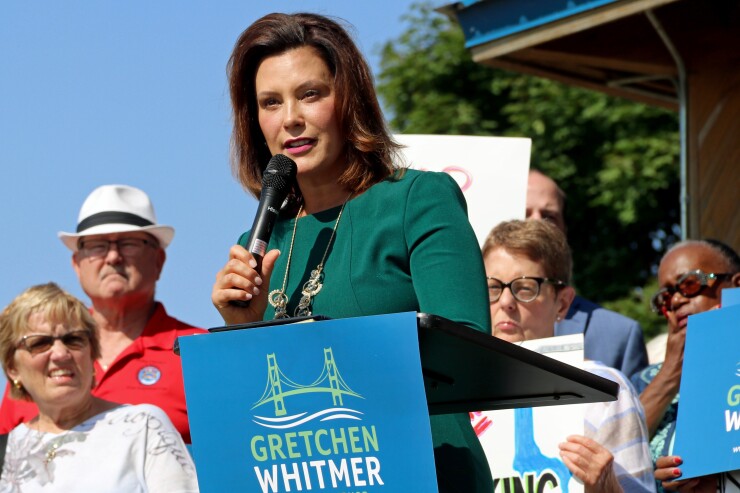Michigan Gov. Gretchen Whitmer threw cold water on a conservative business group's plan to have the state sell $10 billion of bonds to fund teacher pension obligations in order to free up $1 billion annually for road funding.
The West Michigan Policy Forum, a conservative business group, recently proposed the idea to Republican lawmakers as a means to fund road projects as a partisan divide among lawmakers has stalled funding proposals.

"I think that this is an idea maybe retrieved out of Gov. Snyder's trash can," Whitmer said Monday at a public event in Detroit promoting skilled trades. "This was something that was floated, and he rejected because it was not a good idea." Whitmer, a Democrat, was elected in November to replace the termed-out Rick Snyder, a Republican.
Whitmer has proposed a 45-cent-per-gallon hike in the fuel tax to raise the extra $2.5 billion the Michigan Department of Transportation said is needed annually for roads. It's a key component of her $60.2 billion budget proposal for fiscal year 2020 which begins Oct. 1.
Republicans who control the legislature have rejected the first-year Democrat's proposal but have not unveiled any long-term road funding proposals. Senate Majority Leader Mike Shirkey, R-Clarklake, is advancing the idea of issuing bonds to pay down the unfunded pension liability and said it would part of what lawmakers propose to Whitmer.
Matt Fabian, a partner at Municipal Market Analytics, called the idea fiscally irresponsible.
“Pension bonds undertaken to do things not related to pensions are the worst kind of pension bonds in that they are being deployed almost purely as a budget gimmick, adding leverage and risk to a government’s budget in exchange for a few years’ relief from tax hikes or spending cuts,” Fabian said.
Fabian said the state’s consideration of pension obligation bonds suggests problems with their financial flexibility and could be a warning of a weaker credit profile ahead.
“This is also not a good sign for local governments in Michigan who often bear the brunt of balancing the state budget through diminished state aid,” Fabian said.
Michigan is rated AA by S&P Global Ratings, AA by Fitch Ratings and Aa1 by Moody’s Investors Service.
“That same presentation also makes reference to asset transfers to give the appearance of a better funded state pension, a trick that GASB has been attempting to discourage through its recent guidance,” Fabian said. “Michigan does not seem well advised in these things.”
Eric Lupher, president of the Citizens Research Council, a not-for-profit Michigan public affairs research organization, said that it is ironic that fiscally conservative Republicans in the House and Senate are touting a debt plan, not the Democratic governor.
“The past language out of both groups was that the state should be concentrating on relieving itself of debt, whether pension or bonded indebtedness, and getting itself on some financial footing,” Lupher said. “All that seems to be forgotten with the ideas being proposed here.”
Lupher said that the shift in ideology is down to Republican lawmakers looking for a way to shift sales tax revenue from gas sales — worth about $540 million annually — to road repairs from general state funding. “The question is, how do you pay for that and make sure schools and local governments don’t suffer from that?” Lupher said.
Jase Bolger, a former Republican speaker of the state House who now works with the West Michigan Policy Forum, said that the pension system would invest that $10 billion influx of bond proceeds.
If that bet pays off, the state could save roughly $980 million a year in School Aid Fund dollars that currently go to pension debt, Bolger said.
“Replacing the unfunded liability with a bond allows you to earn more return on the money because it is invested earlier and it also secures the repayment plan,” Bolger said on a podcast. “Doing that also frees up cash flow and over 30-year amortization it will free up on average about $1 billion a year.”
Michigan’s school retirement system is a closed system and is on schedule to pay down the roughly $30 billion in unfunded liabilities by the end of September 2038. The state contributed $2.8 billion to the system in 2018, which was $317 million above an amount called the annual required contribution. In 2017, the state contributed $2.4 billion, which was $64.7 million more than what was required that year.
Bolger said that meeting the timeline means that “every increase in the school aid fund goes to the pension system over the next 10 years. So you’d have no teacher raises or new money going to classroom.”





